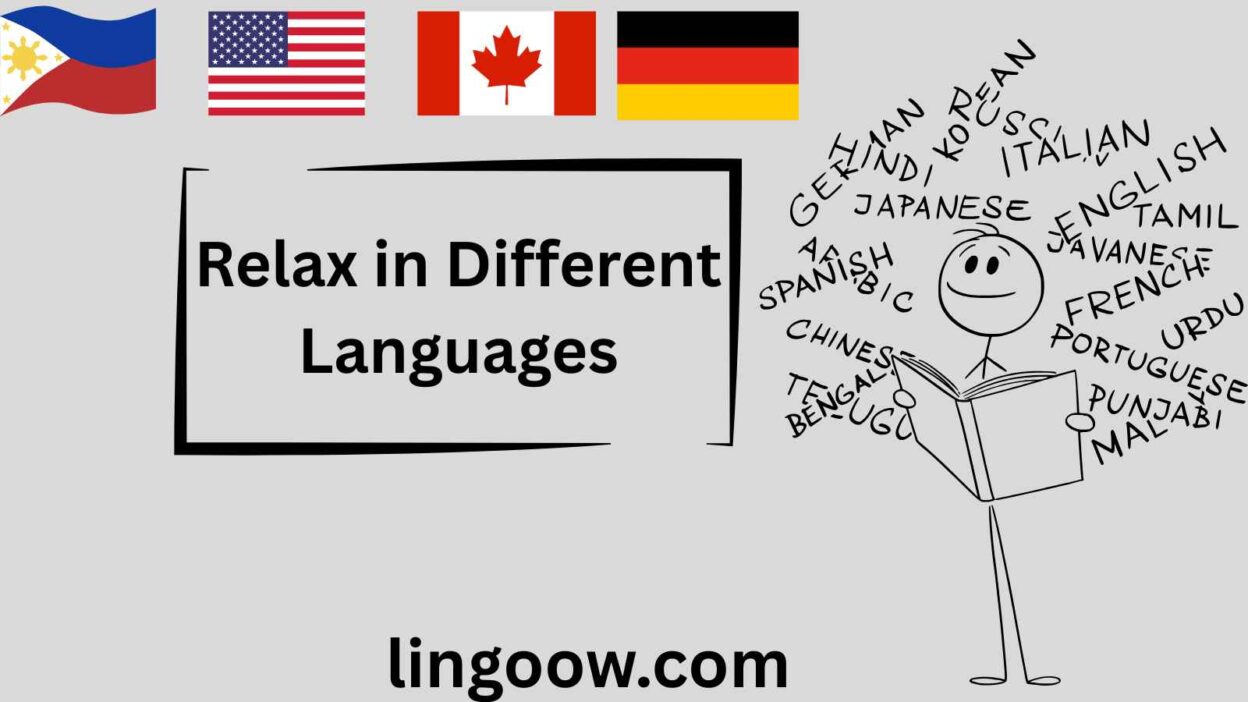Introduction: The Universal Quest for Peace
The word “relax” carries a universal longing—a quiet whisper in every culture, a moment to pause, breathe, and let the weight of the world slip away. I remember sitting on a weathered wooden bench by a serene lake in the Alps, the air crisp and the world silent except for the gentle lapping of water. In that moment, I wasn’t just resting; I was relaxing—surrendering to a peace that felt timeless, borderless. Every culture, in its own way, chases this feeling, weaving it into language, traditions, and daily life. Whether it’s a meditative moment in a Japanese Zen garden or a lively siesta in a Spanish village, the concept of relaxation unites us. Let’s embark on a journey to explore how the world says “relax” and what it reveals about our shared humanity.
Reference Table: “Relax” Across Languages
| Language | Word/Phrase | Cultural/Linguistic Insight |
|---|---|---|
| French | Détendez-vous | Often used formally, as in a spa or yoga setting, evoking elegance and intentional calm. |
| Spanish | Relájate | A warm, casual invitation to unwind, often heard during social gatherings or siestas. |
| Italian | Rilassati | Conveys a laid-back Mediterranean vibe, tied to enjoying life’s simple pleasures. |
| German | Entspann dich | Precise and direct, reflecting Germany’s value of structured relaxation, like a sauna visit. |
| Mandarin | 放松 (Fàngsōng) | Literally “release and loosen,” tied to mindfulness and balance in Chinese philosophy. |
| Hindi | आराम करो (Ārām karo) | Suggests rest and comfort, often used in familial or nurturing contexts. |
| Japanese | くつろぐ (Kutsurogu) | Implies cozy, intimate relaxation, like unwinding at home with tea. |
| Korean | 휴식 (Hyusik) | Formal term for rest, reflecting Korea’s emphasis on balance after hard work. |
| Arabic | استرخ (Istarikh) | Used across Arab-speaking countries, tied to hospitality and moments of calm reflection. |
| Swahili | Pumzika | Means “to rest” or “breathe,” often used in East Africa to encourage slowing down. |
| Zulu | Phumula | Suggests deep rest, rooted in community and recovery after physical or emotional effort. |
| Yoruba | Sinmi | Implies a state of calm or repose, often linked to spiritual or communal harmony. |
| Maori | Whakaāio | Conveys peace and calm, tied to nature and spiritual balance in Māori culture. |
| Hawaiian | Hoʻomaha | Suggests a pause or rest, often connected to the laid-back island lifestyle. |
| Cherokee | Adanvdo | Refers to a state of heart-centered calm, deeply tied to Cherokee spiritual practices. |
European Languages: A Tapestry of Tranquility
In Europe, relaxation is as diverse as the continent’s history. In French, détendez-vous is a polite command, often heard in wellness settings like Parisian spas or yoga classes in Provence. It carries an air of sophistication, as if relaxation is an art form. In Spanish, relájate is more intimate, a word you’d hear from a friend during a sunny siesta or over tapas in a bustling plaza. The Spanish siesta itself is a cultural institution, a midday pause to recharge in the heat of the day.
Italian rilassati evokes images of la dolce vita—sipping espresso in a sunlit piazza or lounging by the Amalfi Coast. Italians view relaxation as a celebration of life’s pleasures, not just a break from work. In German, entspann dich reflects a structured approach to rest. Germans value designated spaces for relaxation, like saunas or quiet forest walks, where efficiency meets calm. Across Europe, relaxation is both a personal and communal act, shaped by each culture’s rhythm.
Asian Languages: Harmony in Diversity
Asia’s vast linguistic landscape offers a rich tapestry of expressions for “relax.” In Mandarin, fàngsōng (放松) literally means “to release and loosen,” rooted in Taoist principles of balance and flow. It’s a word you might hear in a Beijing teahouse or during a tai chi session in a park. In Hindi, ārām karo (आराम करो) is warm and nurturing, often used by a parent encouraging a child to rest after a long day. It reflects India’s familial culture, where relaxation is a shared act of care.
In Japanese, kutsurogu (くつろぐ) paints a picture of cozy, intimate calm—think of unwinding in a tatami room with a cup of matcha. Japanese culture ties relaxation to simplicity and mindfulness, often through rituals like tea ceremonies or onsen baths. In Korean, hyusik (휴식) is more formal, reflecting a society that values hard work but cherishes structured breaks, like a quiet moment in a Seoul café. In Arabic, istarikh (استرخ) is used across over 20 countries, from Morocco to Iraq, often in the context of hospitality, where hosts encourage guests to feel at ease in their homes.
African Languages: Rest as Renewal
Africa’s linguistic diversity shines in its expressions of relaxation. In Swahili, spoken across East Africa in countries like Kenya and Tanzania, pumzika means “to breathe” or “rest.” It’s a word that evokes the rhythm of life—working hard under the sun, then pausing to recharge with family or community. In Zulu, spoken in South Africa, phumula suggests deep rest, often after physical labor or communal celebration, reflecting the importance of recovery in Zulu culture.
In Yoruba, a language of Nigeria and Benin, sinmi carries a spiritual undertone, suggesting a state of repose that aligns body and soul. Yoruba culture often ties relaxation to communal harmony, where rest is a collective experience. Across Africa’s 54 countries, relaxation is deeply communal, rooted in shared meals, storytelling, or moments of stillness under vast skies.
Indigenous & Island Languages: Rooted in Nature
Indigenous and island languages offer unique perspectives on relaxation, often tied to nature and spirituality. In Maori, spoken in New Zealand, whakaāio means peace or calm, reflecting a deep connection to the land and ancestors. Māori relaxation often involves rituals like haka or time spent in nature. In Hawaiian, hoʻomaha suggests a pause, evoking the island’s laid-back lifestyle—think of lounging under palm trees or surfing gentle waves.
In Cherokee, spoken in parts of the United States, adanvdo refers to a heart-centered calm, often achieved through spiritual practices or community gatherings. In Samoan, malolo implies rest after effort, tied to the communal lifestyle of Pacific Island cultures. Across indigenous and island communities in over 20 countries, relaxation is a sacred act, deeply connected to nature, ancestors, and community.
Cultural Insights: The Evolution of Relaxation
The concept of relaxation has evolved across civilizations, shaped by history, religion, and environment. In ancient China, relaxation was tied to Taoist principles of wu wei (non-action), where peace came from aligning with nature’s flow. In medieval Europe, rest was often religious, tied to Sabbath days or monastic retreats. In many African cultures, relaxation has historically been communal, linked to storytelling or dances that strengthen social bonds.
In modern times, relaxation has taken on new forms—spas in urban centers, yoga retreats in Bali, or mindfulness apps in Silicon Valley. Yet, the core remains unchanged: a universal need to pause, reflect, and reconnect. Whether through a Japanese tea ceremony or a Brazilian hammock nap, relaxation is a cultural bridge, uniting us in our shared humanity.
Proverbs: Wisdom in Repose
- Spanish: “El que no descansa, no vive.” (He who does not rest, does not live.) A reminder that rest is essential to a full life.
- Japanese: “急がば回れ。” (If you hurry, take the long way.) Suggests slowing down to achieve true calm.
- Swahili: “Polepole ndio mwendo.” (Slowly, slowly is the way.) Emphasizes the value of pacing oneself.
- Arabic: “الراحة بعد التعب أحلى.” (Rest after effort is sweeter.) Highlights the joy of relaxation after hard work.
- Maori: “Kia tau te rangimarie.” (Let peace settle.) A call for calm rooted in spiritual harmony.
FAQs
Why does “relax” sound similar in many languages?
Many European languages share Latin roots (e.g., relaxare in Latin), leading to similarities like relájate (Spanish) and rilassati (Italian). Shared trade, migration, and colonization also spread similar terms across regions.
What’s the oldest known usage of “relax”?
The English word “relax” comes from the Latin relaxare (to loosen), used in Roman texts around the 1st century BCE to describe easing physical or mental tension.
How do cultural differences shape the expression of relaxation?
In collectivist cultures like those in Africa or Asia, relaxation is often communal, tied to family or group activities. In individualistic societies like Germany, it’s more structured and personal, like a solo hike or spa visit.
Conclusion: The Universal Language of Calm
From the bustling streets of Tokyo to the quiet savannas of Kenya, the word “relax” carries a universal truth: we all seek moments of peace to recharge our souls. Whether it’s détendez-vous in a Parisian café or pumzika under an acacia tree, relaxation is a thread that weaves through every culture, binding us in our shared humanity. It’s a reminder that, no matter our language or traditions, we all crave a moment to breathe, to be. What does “relax” mean to you? Share your language, your culture, or your favorite way to unwind in the comments below—let’s celebrate the beauty of serenity together.




